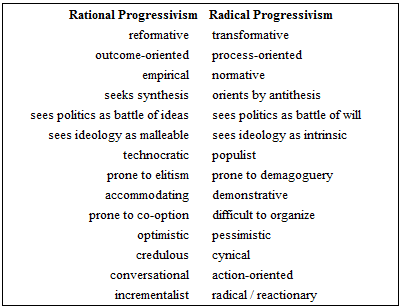( – promoted by buhdydharma )
Almost a month ago, the world heaved a huge sigh of relief when we joined the Obamas and the Bidens in saying goodbye to the presidency of George Bush. But we hardly had time to catch our breath because the work that followed that moment is so overwhelming. For progressives, there is not only the task of cleaning up the countless messes left by the Bush administration. Even if all of that is accomplished, we only go back to fighting the old battles that progressives have always waged against the MIC, US hegemony, the shortcomings of capitalism, and all the “isms” that plague our politics and culture (just to name a few).
The interesting thing is, blogging was born during the Bush administration and therefore has no history with what it means to take on these issues now that the solidifying force of opposition to the worst president in our history is over. Is it any wonder that there is conflict over how to move forward now?
You can see and feel these strains all over the blogoshpere. There are heated battles to be observed on blogs, between diarists, in comment sections and even between blogs. I think its worth it to not only experience these tensions, but to talk about them and try to understand what we can about why they exist.
Toward that end, I’ve been following one of the clashes that is taking place inter-blog between David Sirota from Open Left on the one hand and Nate Silver of FiveThirtyEight and BooMan on the other.
This has been going on almost since the election was over, so its hard to capture all the twists and turns as it has played out. But yesterday Nate wrote a diary titled The Two Progressivisms that I think at least begins the process of understanding the different factions that are developing. He calls them “rational progressivism and radical progressivism” and offers this chart of the difference.
Here’s a bit more about how he defines the two.
Rational progressivism tends to be trusting, within reason, of status quo political and economic institutions — generally including the institution of capitalism. It tends to trust these institutions because it believes they are a manifestation of progress made by previous generations. However, unlike conservatism, it also sees these institutions as continuing works in progress, subject to inefficiencies because of distorted or poorly-designed incentives, poorly-informed or misinformed participants, and competition from ‘irrational’ worldviews like religion. It also recognizes that certain persons who stand to benefit from preserving the status quo, particularly elected officials but also corporations, may seek to block this progress to protect their own interests. The project of rational progressivism, then, is to propagate good ideas and to convert them, through a wide and aggressive array of democratic means, into public policy…
The second type of progressivism is what I call radical progressivism. It represents, indeed, a much more radical and comprehensive critique of the status quo, which it tends to see as intrinsically corrupt…
Radical progressivism embraces the tradition of populism and frequently adopts a discourse of the virtuous commoner organizing against the corrupt elite. It is much more willing to make normative claims than rational progressivism, and tends to view conservatism as immoral and contemporary American liberalism as amoral (at best). Its project is not reform but transformation.
If you want to see Sirota’s response to this, you can read it in his diary titled Dangerous and Paul Rosenberg of Open Left writes Progressive Confusion. As of this writing, BooMan has weighed in with a short one titled I’m With Nate Silver but promises more later. I’ll keep an eye out for that and update when its published.
Whether you agree with Nate’s characterization or not (I find these kinds of things almost always miss alot), it can be useful in at least beginning to understand the schisms that develop on the left. Overall, I find it helpful to think in terms “reform vs. transformation.” And I think the question of how incremental change either helps or hurts the long-term ideals to be a challenging one.
As one who often finds common cause with both sides, my one wish is that we could talk about all of this out in the open without the need to disparage those who take an opposing view. In my perfect world, the radicals would be the champions of the ideals and the rationals would be the ones making the everyday steps in that direction. I know that’s nirvana and the real world rarely plays out that way. But I also believe that history tells us that, while there was serious tension between Martin Luther King, Jr. and Malcolm X, both of them were necessary to finally get the job done.
Almost three years ago, a blogger named leftvet had it just about right I think in his diary titled On Moderates and Radicals.
Radical leftists fulfill another role, also. We can make the proposals of the liberal leftists look appealing to the moderates. We spout revolution; they offer reform. Their proposals for “change” look “moderate” when compared to ours. Some of the great pieces of social legislation of which the Democratic Party is justifiably proud started out as the revolutionary ideas of the radical left that were “reformed” down by the liberal left, and ultimately accepted by the moderates.
My message in all this? Do not silence your radicals. Do not be ashamed of them. Welcome them to the discourse, engage them in constructive debate, listen to their challenges, and challenge their assumptions. That is what democracy is fuckin all about.
This country has been – and will be – the better for it.
emphasis mine



17 comments
Skip to comment form
Author
…albeit the categories, as you said, left something to be desired, and seem to carry the assumption that once a person gains sophistication in building coalitions and the realities of change, they are somehow more realistic in their goals. I think that is a tendency more than a truth, and it begs the deeper issue of how to give sophistication to people without rendering them righteous, burning them out on the practicalities, or leaving them cynical. Unfortunately that has a lot to do with where they choose to volunteer :}
Am seeing the same sort of splits, but wondering — and I know this is very simplistic — to what degree it rests, simply, on 8 years of watching everything go to hell fast. There was always some fresh horror from the Bushies, and while I’d like to think we aren’t purely a reactive bunch…it seems hard to overestimate how that contributed to cohesion. My tentative hypothesis is that the splits were already in place, and without the pressure, all the natural fissures are visible.
And, of course, for those who aren’t in pure scream mode (no matter how radical we might be)…we really don’t know what is going on at this point. There’s the economic mess, but the Obama administration is very new, the earlier administration unprecedented…I mean, there are lots of things in play, but dial it back half a notch and “I don’t know” seems the operative phrase.
Above all — and this is hard to talk about, because it applies in some ways to me, and to many others more talented, but not, I think, to you — in blogworld I see a whole lot of profoundly isolated people. People who care passionately but don’t have a lot of outlets or fora to discuss their political selves, to be seen. It is easy to trivialize that but our political selves need a kind of grace, too…and many, many of us are in places — for a host of reasons — where this is a place someone will actually, y’know, read them and hear. This is so far away from either radical progressivism or new and better democrats that I’m not quite sure where I’m going with it…but it seems to me to be underneath everything.
Don’t you think that who you are depends on where you are?
During Clinton, I was probably a rational progressive. During Bush, radical.
And now? Radical to the extent the old ideas are retread/retried, rational to the extent bold ideas are embraced would be my current guess.
… to me it’s the personal, and I don’t have any answers to this.
Whether radical or rational, if the underlying “human-ness” is sincere, I can reach out and have dialogue, no matter how passionately I may disagree on the issues.
But if a person is a “bad actor” (as defined a while back by ek hornbeck) — then it doesn’t matter if I even agree with them politically. I can never get to the bottom of what they’re trying to say because there is no bottom — and thus the conversation devolves into meaninglessness.
There has to be a baseline of emotional honesty, imo. Otherwise a disruptive person can become an energy sink, draining the group endlessly – and I have yet to see any productive way to deal with that other than to acknowledge it and reject that kind of behavior. As you said in your essay of yesterday, that takes a kind of authoritativeness. But I’ve seen this dynamic play out not only on the blogs but in the workplace and in my own life.
Now that I am older….I am an older radical!
But I sure have learned that just radicals can’t do anything on their own….but without the radicals the rationals would not know what to fight for, lol. That is of course a highly subjective view.
To radicals, the ideas, ideals and principles are most important and to the rationals the process is most important?
In any case leftvet was right, we need both. Finding a way to take that dialog of of the personal level is what will finally allow that melding.
But one thing is for sure. The only reason the Right ever wins is because of division and the weakness that causes on the Left.
I would have to be ultra radical progressive?
I have to do cleansing meditation even after viewing Keith Olberman. Everything in the English language transmitted over the airwaves is propaganda.
I fully embrace the theory of the deliberate suppression of “free energy” technology.
I know that most of those shiney electronic gadgets Americans are obsessed with are really links of the bondage chains used to enslave us.
The phrase “in this post 911 world” provokes my violent “Fuck you Satan” mental response every time I hear it.
Difficult to organize? Hell I don’t even understand myself sometimes.